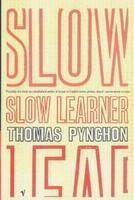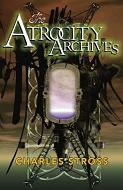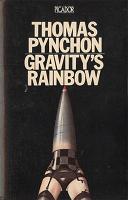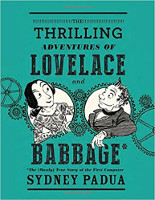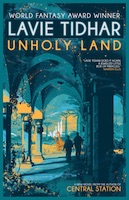 Lavie Tidhar follows up his 2016 Mosaic Novel/Short Story collection Central Station (John W Campbell winner, Clarke shortlist, and book of the year for me) with Unholy Land, an alternative history concerning a Jewish Homeland in Africa which turns out to be much more more.
Lavie Tidhar follows up his 2016 Mosaic Novel/Short Story collection Central Station (John W Campbell winner, Clarke shortlist, and book of the year for me) with Unholy Land, an alternative history concerning a Jewish Homeland in Africa which turns out to be much more more.
It's not as light, not as dancingly sparkling with ideas and concepts as a lot of the former is, but at the same time it's maybe heavier, worthier, loaded with thought-provoking takes on identity, the fluidity of reality, and weighty moral questions which are exhibited rather than discussed or preached.
It starts simple enough, though – we follow one Lior Tirosh (a thinly disguised alter ego, it appears), a moderately successful writer of 'inconsequential fantasies' in some personal crisis, as he is headed to Ararat City, Palestina. Which is set in Africa, in the Great Rift Valley. And so we know we are in an alternative history – or, to be more precise, in a world where the Wilbush expedition to British East Africa returned a different report, had a different outcome, and a Jewish state, a Nachtasyl, was created instead of the country we are familiar with. At first this is, like all such conceits, mightily disorienting. We see Palestinians, who speak Judean, and a culture which inevitably has taken on parts of the area it has settled in and the people it displaced, whilst retaining a lot of the tensions and drivers that brought it here.
But back to Tirosh – he is here to visit his ailing father, a general and famous figure, we learn later on. But instead he gets, more or less from the go, caught up in strange happenings involving Border/Secret police, multiple agencies following him, murder (it's actually an attempt on his life which catches an acquaintance), a disappeared niece who campaigned for the rights of the native population, a builder who builds the wall designed to keep the terrorists and suicide bombers out... it's a fascinating and dizzying world, and you get absolutely no time to get used to it before the action kicks off.
“Then he asked you if you thought the world was real”
And just when you think you know where you are with the premise and the setting then the story takes a sharp turn into the leftfield. Tirosh is a damaged man – not just from the loss of his son and his wife, but there is something else. He comes from “Outside”. He has visions of other worlds, of concentration camps. We see several agencies who work across different worlds, across possibilities. We learn that the wall has other aims than simply keeping Suicide Bombers out. That time can run differently on the Outside. There is more, so much more, and most of it only gets hinted at, is never explained or barely shown. And boy would I have wanted to see, learn, read more.
“The world is the sum of what it could be, what is might have been, and how it could have been”
The story is told through the eyes of the protagonists – and the viewpoint frequently shifts fluidly between them which can be rather disorienting; and occasionally it does so in ways evidently designed to actively mislead the reader. Tidhar also heavily uses foreshadowing, giving the reader (sometimes misleading) information advantages, again occasionally, purposefully, and skilfully misleading us.
I was surprised at how little there is here in terms of looks, skin colour, racial origin. It's not that book entirely omits this, but given the setting I would have expected more variety warranting comments, descriptions, and assignations. This is a minor quibble – what bothered me more was that we learn so little about the parallel worlds, the sephirot, and how they hang together; how people travel between them; who this mysterious Border Agency is which seems to look after some of it; or also the rather mythically infused final denouement, which I found to be a bit of a let-down after all that had transpired.
Still, this is great and all too short book, delivering much more than it originally promises, and for this alone it deserves your attention.
Lavie Tidhar is an Israeli-born writer, who has spent long periods of time in South Africa, Laos, and Vanatu, and who is now living in London. He writes across genre boundaries, and is the author of the World Fantasy Award–winning novel Osama, of the Jerwood Fiction Uncovered Prize-winning A Man Lies Dreaming, and the Campbell Award-winning Central Station, in addition to a number of other books and many short stories.
More Lavie Tidhar
Title: Unholy Land
Author: Lavie Tidhar
Reviewer: Markus
Reviewer URL: http://thierstein.net
Publisher: Tachyon
Publisher URL: http://www.tachyonpublications.com
Publication Date: October 2018
Review Date: 180925
ISBN: 9711616963057
Pages: 196
Format: ePub
Topic: Alternate History
Topic: Parallel Worlds
Thanks to the publisher for the review copy.




